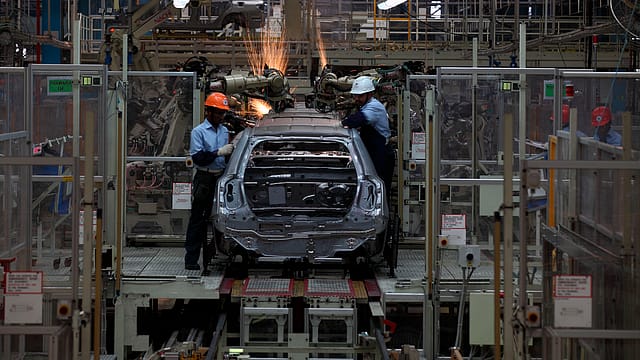Tata Motors Q1 loss widens to ₹5,007 cr as China lockdowns hit JLR sales
ADVERTISEMENT

Tata Motors on Wednesday reported a consolidated net loss of ₹5,007 crore for the quarter ended June compared with ₹4,450.92 crore in the year-ago period as sales of Jaguar Land Rover got impacted due to chip shortages and Covid-19 lockdowns in China.
Revenue of the automaker rose 8% to ₹71,935 crore during the April-June period compared with ₹66,406 crore in the year-ago quarter.
Retail sales of Tata Motors' subsidiary JLR stood at 78,825 vehicles in the first quarter of the financial year 2022-23, broadly flat compared with Q4 FY22 and down 37% compared with Q1 FY22. Revenue during the quarter was down 7.6% sequentially.
Semiconductor shortages compounded by slower-than-expected production ramp up of New Range Rover and Range Rover Sport along with Covid-19 lockdowns in China impacted production and sales in the quarter, the carmaker says in an exchange filing.
Demand, however, remains strong as JLR's order book grew further to 200,000 vehicles, with Range Rover, Range Rover Sport and Defender accounting for over 60% of client orders.
Tata Motors' passenger vehicle business continued its strong momentum with wholesales at 130,351 units, up 101.7% versus Q1 FY22. "Demand for passenger vehicles continued to stay strong in Q1 FY23 even as the supply side remained moderately impacted. The SUV portfolio contributed 68% of Q1 FY23 sales. Margin improvement was led by strong volumes, improved mix, and impact of higher operating leverage," the carmaker says.
The company says it will continue to drive strong sales performance and sustain profitability and cash flow improvement measures. In electric vehicles, the business will drive up penetration and accelerate sales further as the supply situation improves, it adds.
Despite significant step-up in investments, the PV business is expected to remain self-sustaining whilst the EV business investments are well funded with the capital infusion, says Tata Motors.
"Tata Motors consistently set new sales records every month in passenger vehicle to record the highest ever wholesales and production of around 130,000 vehicles, twice as compared to Q1FY22. Electric vehicle sales too scaled new peaks month-on-month to deliver over 440% growth in Q1 FY23 versus Q1 FY22," says Shailesh Chandra, managing director of Tata Motors Passenger Vehicles Ltd & Tata Passenger Electric Mobility Ltd.
"Going forward, we expect the supply side, including that of critical electronic components, to progressively improve," he adds.
The company's commercial vehicles business witnessed strong volume growth as compared to Q1 FY22, which was impacted by the second wave of the Covid-19 pandemic. For India business, domestic wholesales were at 95,895 vehicles, up 124% year-on-year. Exports stood at 5,218 vehicles, lower 22.6% affected by financial crises in few export markets.
Tata Motors expects demand to remain strong despite worries on inflation and geo-political risks while the supply situation is expected to improve further.
"Cooling commodity prices are expected to aid improvement in underlying margins. We aim to deliver strong improvements in EBIT and free cash flows from Q2 onwards to get to near net auto debt free by FY24," says the company.